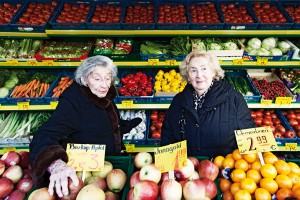On the occasion of Julia Child’s 100th birthday I watched the film “Oma & Bella.”
Oma and Bella share with Julia Child a love of cooking. They are not yet 100, but not far off: they are 84 and 88 and live in Berlin. Fifty years ago they went dancing at the “Las Vegas”; today they go to the “Chalet Suisse” and drink Berliner lager. Oma’s granddaughter made a film about them: having their hair done, out on a boat trip, watching television, and again and again, cooking in Oma’s kitchen. Oma and Bella are Holocaust survivors. The granddaughter asks them about it, but rather than talking about their survival they discuss the not-being-able-to-talk-about-it. They drink coffee with a friend who was in Auschwitz. She doesn’t speak of it either, other than to say that the writing on her arm is not a phone number and that she doesn’t want to say anything.
Here and there, single recollections emerge. Oma mentions a man who abandoned her and her child and another man who was still handsome after dying. Bella speaks of the smile on her dead father’s face, her father who hanged himself rather than face imprisonment by the Germans. She also says one day that she couldn’t sleep: she’d dreamed of someone from the Ghetto. He’s no longer alive. One would like to know who he is and what happened to him.
One would like to hear more about these things that she doesn’t speak about.The granddaughter asks – but she receives no real answers. And I don’t either in my seat in the cinema. Oma and Bella spray their hair and keep cooking. And exercise their right to remain silent.
Oma & Bella (directed by Alexa Karolinski, 2012) is playing in movie theatres across Germany starting 23 August.
Monika Flores Martínez, Exhibitions

